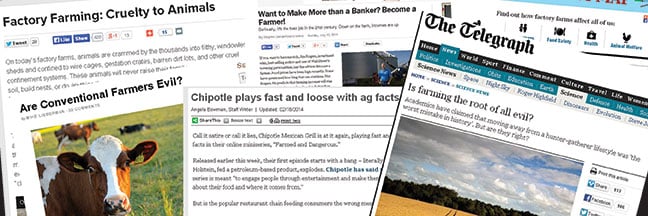If your neighbor was spreading lies about your farm, you would be mad. If someone was badmouthing your family, you would be livid.
Guess what? Armies of activists tell anyone who will listen that farmers regularly abuse animals and harm the air, water and food supply, all for their own greed. Mad yet?
Farming’s image is diminished daily by the food, environmental and animal rights activists. Yet too many farmers look the other way. They have never read anything Michael Pollan has to say, seen a single frame of the ‘Food Inc.’ film or even know the true motives of the Humane Society of the United States.

Agriculture’s apathy in the face of amped up advocacy by its vocal opponents is taking a toll.
Most politicians believe that for every call, letter or e-mail they receive on a topic, there are another 100 people who feel the same way, but didn’t voice their opinion. Too many farmers and agriculturists are falling into that camp. Those of us who know which end of a cow the milk comes out of are already a small minority. We need every last aggie to speak up.
It pains me to put this in print, but agriculture’s influence is shrinking. The long-delayed farm bill ought to be enough proof of this on the federal level. Now it’s happening in the Wisconsin Legislature too, where fewer than 10 of the 132 members are farmers. A common sense update to laws pertaining to high capacity wells is dead in the water. Lawmakers didn’t hear from enough farmers, but they heard from plenty of alarmist environmentalists. Now getting a well permit, or transferring ownership of one, just became a legal (and more costly) affair.
Our opponents often use a divide-and-conquer to approach with the farm community. Other times, we fail to unite on the most important issues on our own. Call the animal, food and environmental activists all the names you want, but I will give them this much, they’ve grasped the importance of building coalitions and using technology to advance their causes.
All is not lost. We have some great advocates who use social media to bring the world to their farms, and engage the hearts and minds of consumers. Yet this is an all-hands-on-deck type of job. A handful of bloggers and active Facebook users, coupled with the hundreds of people who attend ‘Ag Day at the Capitol’ cannot do this alone.
I’ve heard it said that unless there’s an emergency, nothing stirs up the farm community enough for them to set their chores aside and make a call or shoot off an e-mail. Have we really got to that point? If the regulatory pendulum ever swings hard against farming, will there be enough lawmakers in an increasingly urban society to right the ship?
What can you do?
- Not on Facebook? Change that.
- On Facebook? Create a page especially for your farm.
- Know what others are saying about agriculture and participate in the public dialogue about farm and food issues.
- Don’t tear down one type of agriculture to build up another.
Modern agriculture has become specialized. Custom harvesters, full-time milkers, nutritionists, veterinarians, agronomists, mechanics, accountants and attorneys have allowed farmers to ‘farm-out’ the things they don’t like to do. However, there’s one thing you can no longer afford to leave to someone else: communicating and advocating for agriculture’s best interest.
In many ways, Casey Langan has spent much of his life working for farmers. What began as a childhood fascination with his grandpa’s herd of cows yielded him a career. Only this farm hand’s plow is usually a pen. Milking cows and working in the tobacco fields of his native Edgerton eventually gave way to reporting for a weekly farm newspaper, working for a farmer legislator and the Farm Bureau.



Leave a Reply